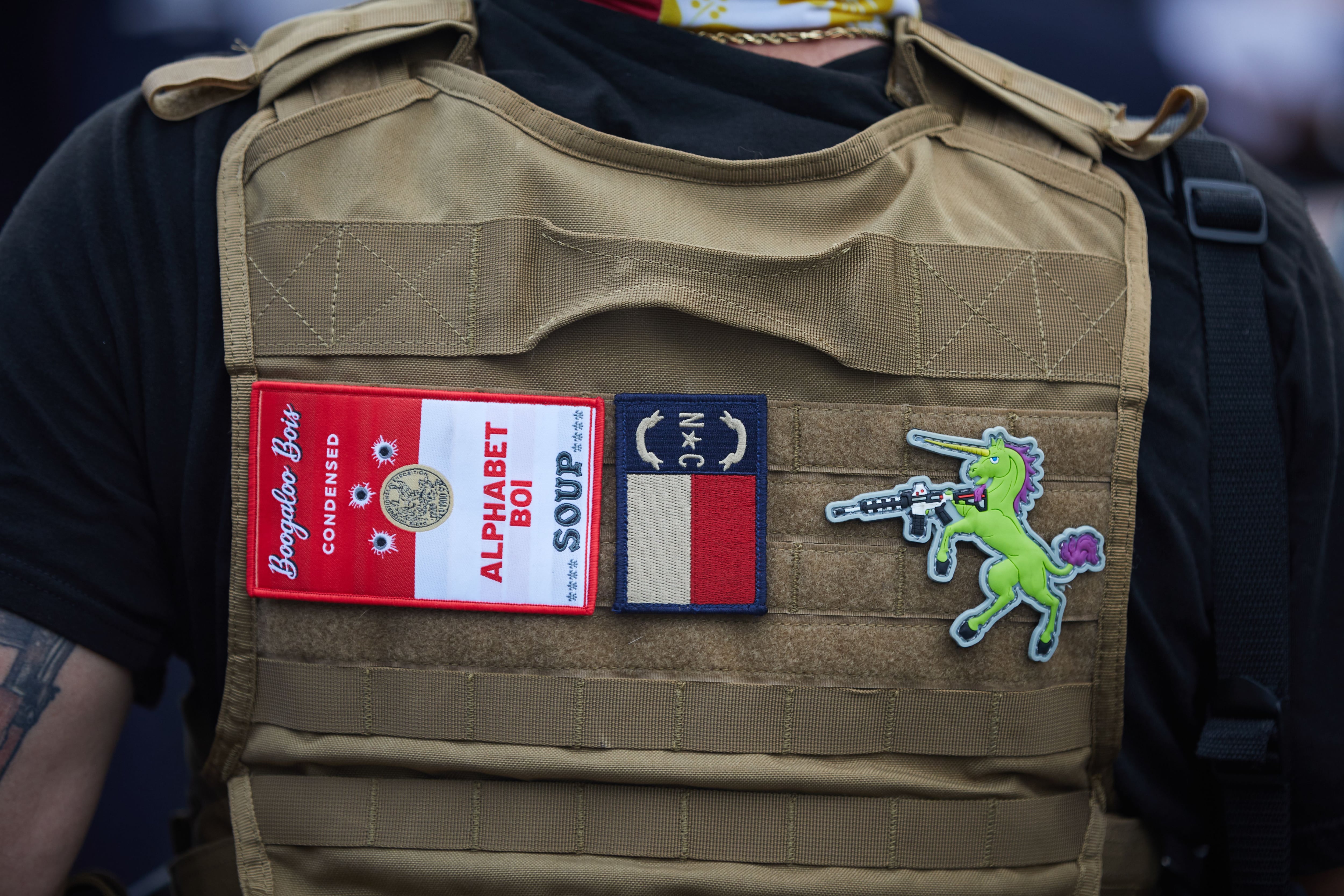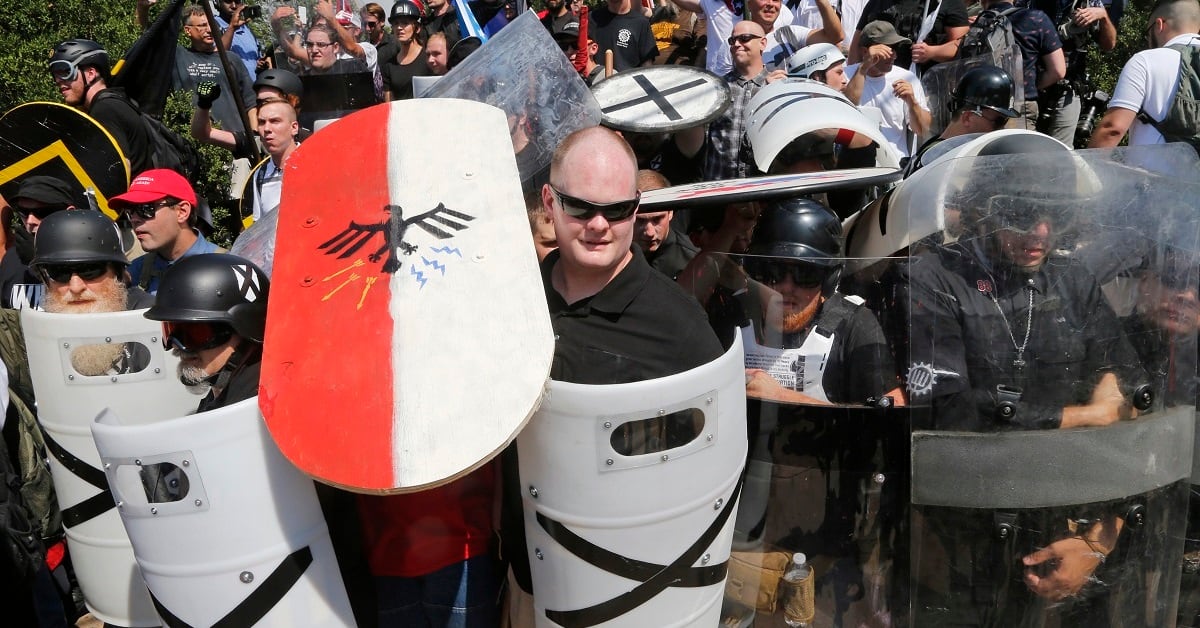In June, a U.S. Army private was arrested in Italy, charged with leaking classified information to a neo-Nazi cult. Ethan Melzer, just 22, allegedly plotted to orchestrate a “jihadi attack” on his own unit.
Melzer was not the first. The U.S. military has long struggled with extremism among the ranks of active duty soldiers and veterans — a cancer most painfully felt when a U.S. Army veteran turned his military training against the American public he once swore to protect in his murder of 168 at Oklahoma City in 1995. Over the past several months, as the rise of the “boogaloo movement” and resurgence of anti-government extremism has reared its head, the issue has again garnered widespread attention — from media exposés of extremist groups and movements infiltrated by military veterans to analysis of racial symbolism within military institutions. But few have offered solutions.
RELATED

Parents for Peace, a non-government organization seeking to implement a public health approach to countering violent extremism, has designed a program to help military veterans return to public life. Chris Buckley is a Parents for Peace member, combat veteran, and former KKK member who founded “Trauma Anonymous” as the culmination of his journey of healing and recovery from an addiction to hate. The program is tailored to tackle the main causes behind the issue — most notably the prevalence of post-traumatic stress and stigmas over mental health interventions, isolation from civilian life, and a necessarily radicalizing military culture.
Firstly, and most essentially, the U.S. military culture has consistently failed to ensure mental health issues are addressed compassionately and effectively. As an institution, the U.S. military is highly organized, rigid, and hierarchical to maintain order, consistency, and efficiency among 1.3 million troops across six service branches. Indoctrination into military culture begins with eight to 12 weeks of basic training. In preparation for combat, recruits learn values like courage and loyalty to fellow soldiers. Soldiers also learn about the institution’s number one priority: physical and psychological strength. It is important not only to depend on one’s unit but also to be dependable, putting the unit and mission above all else. While these values are useful to the institution in winning wars, they are often detrimental to the soldier’s psychological health if he or she does not seek and obtain appropriate care. Veterans commit suicide at more than twice the rate of peers in civilian life.
In recent years, the U.S. Department of Defense (DoD) has recognized these detrimental trends and implemented changes to increase the availability of mental health resources and remove the stigma around seeking help. In 2009, DoD launched the “Real Warriors. Real Battles. Real Strength.” campaign that seeks to promote open and transparent conversations about soldiers’ struggles with mental health issues by sharing personal stories, providing resources, and connecting military personnel with mental health care professionals. Despite these commendable initiatives, mental health resources have been noted as inadequate during and after military service.
Further, the stigma around seeking mental health services has not dissipated, as some soldiers are still concerned that seeing a mental health care professional will “sink their careers.” Some fear that seeking mental health services could result in the loss of security clearance or being discharged from service. In other cases, soldiers may not recognize their psychological struggles, but studies have shown that this is not the norm. One study found that more than 75 percent of soldiers who have a psychological disorder recognize their struggles, but only 40 percent report interest in getting help.
Past trauma, substance abuse, and mental health issues are the three key elements that extremists seek to exploit in their recruiting. Like Chris, returning soldiers suffering from the first often turn to the second, compounding their pain and susceptibility. As such, active-duty service members and veterans are highly sought after recruits for extremists, not only because of their training, skills, and access to sensitive information and weaponry, but also because of these perceived weaknesses.
RELATED

Yet targeted recruiting is not the only reason military personnel may join extremist groups. It is not uncommon for service members to feel isolated from civilian society. As retired U.S. Army Col. Jeff McCausland writes, service members returning from Afghanistan or Iraq “frequently voice a desire for the sense of belonging, brotherhood, and patriotism which they had in the military or during deployment…[and] can grow frustrated trying to find employment that might facilitate their reintegration.” Extremist groups provide these service members with a sense of familiarity, as they often operate as militias, which validates service members’ identity as soldiers and provides them with a purpose and sense of community.
Finally, as an essential element of training, soldiers also learn to dehumanize the enemy. The military wants killing machines, not empathetic human beings; the enemy in the crosshairs cannot be seen as anything more than a target to eliminate. Too often, dehumanization has involved racial denigration, enemies of different races in foreign lands labeled as more than just battlefield opponents, but as a racial enemy fighting against American “freedoms.” The issue is amplified, of course, by the fact that most U.S. Army troops will, at some point, train on a base named after a Confederate leader. The U.S. military sees the radicalization of its soldiers as essential to winning on the battlefield — but does not similarly prioritize the deradicalization of returning veterans as key to protecting the homeland. Far-right extremist groups are particularly effective in playing to the service member’s patriotism — they consequently peddle the same “us vs. them” narratives the military fed its soldiers, and in turn succeed in dividing American society.
In a press release, an acting U.S. Attorney described Ethan Melzer as “the enemy within.” Assistant Attorney General for National Security John C. Demers added, “Our women and men in uniform risk their lives for our country, but they should never face such peril at the hands of one of their own.” Extremism in the military has long been a threat to the homeland and to returning soldiers destined for terrifying lives of hatred. It’s now also a threat to the military itself. It is beyond time to act.
So is there a solution? Experts say returning service members are most vulnerable to extremists’ radicalization attempts “immediately after leaving military service.” But the military’s two-week mandatory demobilization process consists primarily of paperwork and physical checks. While the process does include a psychological evaluation, it is brief and generic. There is a common understanding among returning service members that they should not discuss mental health issues during the evaluation, as their return to family and friends will be delayed. Because of this fear, many returning service members wait until they are back home to visit their local Veterans Affairs office — others do not seek help at all.
Trauma Anonymous rests on three pillars, all essential to promoting the deradicalization of service members. The program addresses mental health issues by helping service members address the trauma they experienced in the line of duty. It teaches coping tools and provides care and support to protect veterans recovering from the necessarily dehumanizing mindset taught by the military. Finally, the program helps returning service members develop the skills they need to successfully reintegrate into civilian society.
Because of extremists’ targeted recruitment efforts and returning service members’ susceptibility to radicalization, we cannot leave it up to the service members to identify when they need help, find resources, and obtain appropriate mental health services. Instead, we must remove this burden from service members’ shoulders by implementing a moral cognizant program like Parents for Peace’s Trauma Anonymous as part of the military’s mandatory demobilization process. Trauma Anonymous’ non-medicated and non-invasive approach would de-stigmatize mental health services and provide much-needed help to returning service members — helping make sure every one of our war heroes can return home to safe, productive, happy, and loving futures.
Chris Buckley is a U.S. Army veteran and former member of the Ku Klux Klan, who now works with Parents for Peace (P4P), a nonprofit taking a public health approach to countering extremism. Myrieme Churchill is the executive director of P4P. Jacob Ware is a researcher studying far-right terrorism and countering violent extremism.





